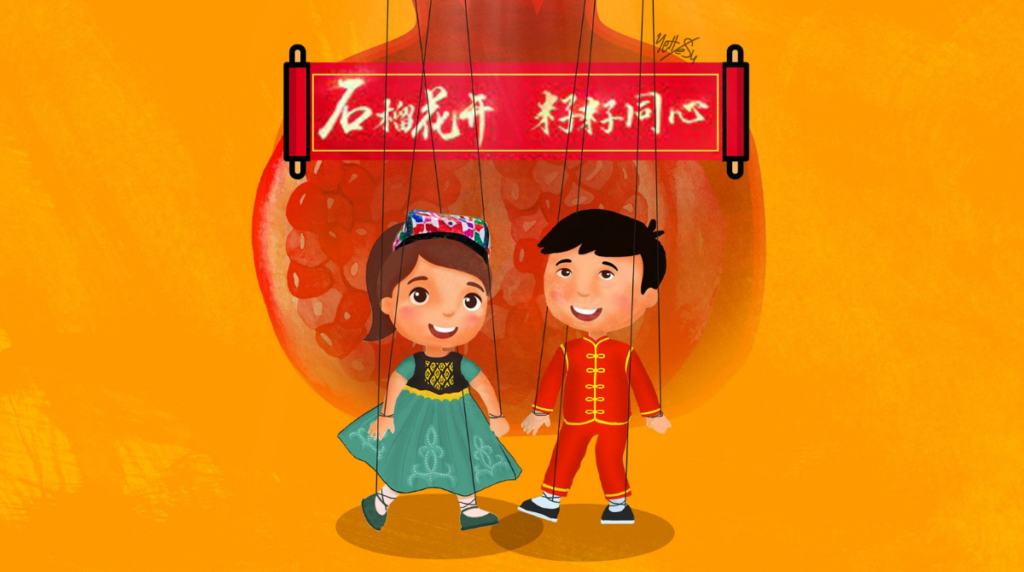UHRP Documents Continuing Assimilationist Policy Targeting Uyghur Children

January 27, 2022, 8:00 a.m. EST
For Immediate Release
Contact: Omer Kanat +1 (202) 790-1795, Peter Irwin +1 (646) 906-7722
The Uyghur Human Rights Project (UHRP) has released a new briefing, Coerced Kinship: The Pomegranate Flower Plan and the Forced Assimilation of Uyghur Children, documenting the deep intrusion of local government officials into the family lives of Uyghurs.
In September 2021, authorities in one East Turkistan village formally rolled out the “Pomegranate Flower Plan,” an initiative to match Uyghur children and children of other ethnic groups across China as “pomegranate pairs.” The name of the program links to Xi Jinping’s pronouncement that “all ethnic groups must cluster together like pomegranate seeds,” which has become a byword for assimilationist policies in the People’s Republic of China (PRC).
UHRP is concerned that Uyghur participants are given no choice in the decision to take part in this program, a violation of their rights to family life and unity. The unidirectional flow of “exchange” from Han children to Uyghur participants in the program further violates Uyghurs’ linguistic and cultural rights. We recommend close scrutiny of “pomegranate” programs in Chinese state media and social media.
“The Pomegranate Flower Plan illustrates how Chinese officials see no boundaries between the state and personal lives. The initiative is likely the brainchild of an ambitious party functionary looking to please superiors. In an environment of intense surveillance and assimilation, private spaces are no longer a reality for Uyghurs. Authorities view any room for private life as a threat, giving rise to ludicrous schemes,” said UHRP Executive Director Omer Kanat.
Dr. Elise Anderson, the author of the briefing, noted, “This briefing offers insight into the everyday struggle of Uyghurs against the assimilationist intentions of the Chinese party-state. Beyond the urgency of the Chinese state’s genocidal policies targeting all Uyghurs are the underreported local initiatives that force families to participate in state-imposed indoctrination and performative programs, in order to avoid detention or incarceration. The fact that children are the focus makes the Pomegranate Flower Plan even more insidious.”
Since the beginning of the mass internment campaign in East Turkistan in 2017, outside observers have expressed concern about the impacts of the atrocities on Uyghur children. Ample evidence has emerged to show that Uyghur children have been deeply affected by the crisis. Children have been forcibly separated from their parents on a long-term basis, institutionalized in orphanages and boarding schools, and put into educational settings where they are not allowed to produce and consume knowledge in their native language. Authorities have also rolled out policies intended to prevent the births of future generations of Uyghur children—a fact which ultimately led an independent tribunal to issue a December 2021 judgment that the actions of the Chinese party-state rise to the level of genocide.
In Coerced Kinship: The Pomegranate Flower Plan and the Forced Assimilation of Uyghur Children, UHRP presents evidence of unabated government- and party-supported efforts to intervene in and re-engineer Uyghur life.
We collected evidence from Chinese state media and social media to analyze the significance of the Pomegranate Flower Program. The program, an officially backed local-level initiative to foster interethnic “kinship” between Uyghur children from East Turkistan and children of other ethnic groups from across the PRC, was introduced in a village in Kashgar prefecture in September 2021 and apparently continues to operate in this location as of January 2022.
Examining this local initiative gives us a chance to zoom into the experience of daily life in East Turkistan’s townships and villages, which have long been sites of tight surveillance and control. The Pomegranate Flower Program gives insight into how local leaders adopt slogans and implement policies inspired by the top of the political hierarchy, as well as how those leaders instrumentalize social policy and other governance institutions to continue controlling Uyghur lives.
In this context, the local-level Pomegranate Flower Plan is part of an officially sanctioned effort to destroy Uyghur culture and social life, replacing them with coerced kinship based in Mandarin as a common language and love of the party-state as a core value. We are deeply concerned that Uyghur participation in the program is involuntary—a violation of fundamental rights.
